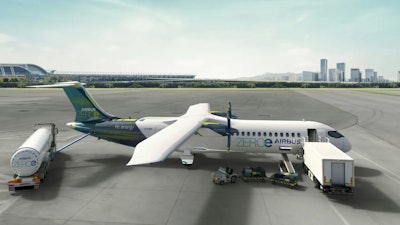
Airbus, Kansai Airports, and Kawasaki Heavy Industries (Kawasaki) have signed a Memorandum of Understanding (MoU) to study the feasibility of hydrogen infrastructure at three Japanese airports operated in the Kansai region - Kansai International Airport, Osaka International Airport, and Kobe Airport.
With this MoU, the three parties will conduct an initial feasibility study for the introduction and operation of hydrogen aircraft as part of the “Hydrogen Hub at Airports” program and strengthen collaboration to materialize the supply of hydrogen to aircraft at the three airports.
The new initiative will focus on the definition of a hydrogen infrastructure and supply a roadmap at all three airports. This will be based on specific aircraft and airport characteristics.
The results will be evaluated from the perspectives of technology, economics, legal compatibility and operations. The approach to the challenges identified will be clarified through potential demonstration projects to be launched and roadmap development, leading to policy recommendations.
Since 2022, Airbus has worked with Kansai Airports on the use of hydrogen in the development of airport infrastructure, where Kansai Airports demonstrated world class hydrogen infrastructures exemplified by fuel cell buses and forklifts in full operation. The three airports have their own geographical and traffic characteristics which allowed Airbus to study multiple means to supply hydrogen into the airport premises.
The manufacturer has also worked with Kawasaki for the preparation of the hydrogen-fueled ecosystem, where Kawasaki, as a leading hydrogen solution provider, demonstrated strong capabilities to design several end-to-end cryogenic hydrogen supply network options. Kawasaki has experience in the installation of baggage handling systems and other systems at a number of airports, and has knowledge of airport infrastructure development.
Both studies have delivered solid understanding about hydrogen infrastructures at the airports and the successful partnerships evolve into the second phase of the integrated feasibility study. Collaboration between the three parties enables more feasible studies that incorporate the perspectives of both supply chain and airport operations.
Under the partnership, Airbus carried out a liquid hydrogen demand forecast for the airports where a few tons of liquid hydrogen per day would be required to support the aircraft operations in the early stage of introduction. It is forecasted to increase towards up to several hundreds tons per day around 2050. Airbus has observed a mature hydrogen industry footprint in Kansai and other regions backed by extensive policy measures and foresees a promising market for hydrogen aviation.
Airbus, Kansai Airports and Kawasaki will contribute to the early realization of the decarbonization of airport infrastructure in Japan by collaborating on this MOU, with the aim of realizing a society in which hydrogen aircraft can operate in the future.
The use of hydrogen to power future aircraft is not only expected to significantly reduce aircraft emissions in the air, but could also help decarbonize air transport activities on the ground. In 2020, Airbus unveiled the first ZEROe concepts with the ambition to bring to market the world's first hydrogen-powered commercial aircraft by 2035. The development of the corresponding technology bricks is now underway in a global Research & Technology network.






















